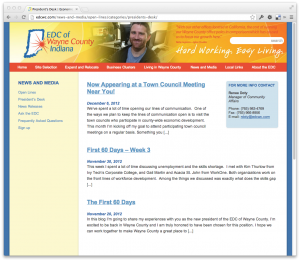 I'm excited to see that Valerie Shaffer, the new President of the Economic Development Corporation of Wayne County, has started a blog about her activities in that role. The blog is complemented by a "frequently asked questions" section on the EDC website, which tries to address some of the common questions (and misperceptions) about the organization.
I'm excited to see that Valerie Shaffer, the new President of the Economic Development Corporation of Wayne County, has started a blog about her activities in that role. The blog is complemented by a "frequently asked questions" section on the EDC website, which tries to address some of the common questions (and misperceptions) about the organization.
Whatever your take on the EDIT Tax, the EDC and their role in economic development efforts, this is a new and welcome level of transparency.
Shaffer's posts so far are authentic and to the point, bypassing some of the marketing spin that it might be tempting for an organization of the EDC's prominence to engage in when they know site selectors are looking. She links to related resources, encourages questions and feedback, and makes repeated commitments to opening the lines of communication between her office and other voices in the community.
Continue reading "Blogging about economic development in Wayne County"






